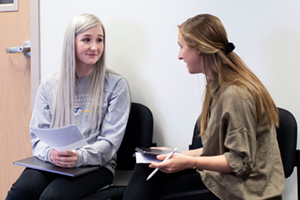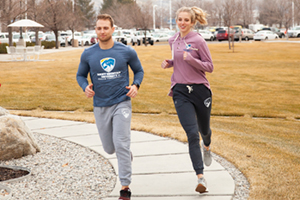The Eight Dimensions of Wellness
The Eight Dimensions of Wellness, as defined by Substance Abuse and Mental Health Services Administration (SAMHSA), are categorized by the following: Emotional, Physical, Spiritual, Social, Intellectual, Occupational, Environmental, and Financial. Maintaining wellness and balance in each dimension of wellness is a vital component to overall student health. SAMHSA provides a Step-By-Step Guide to Wellness that explores different ways to develop your dimensions of wellness.
RMU provides campus and external resources for each of the Eight Dimensions of Wellness. We encourage students to frequently utilize this page as an additional resource to locate wellness related resources, support, tips on how to improve dimensions of wellness, news articles, and contact information.
Emotional Wellness
Emotional wellness involves your ability to cope with life stress, express emotions, and feel positive about your life. It includes being aware and accepting your thoughts, feelings, and behaviors by managing them in a healthy way. Emotional wellness also includes awareness of your strengths while recognizing individual areas for improvement. Being emotionally well allows you to express your feelings without restraint and increase your capability of forming healthy connections with others.
- Stay positive
- Practice gratitude and self-compassion
- Avoid overthinking or ruminating on mistakes or negative thoughts
- Incorporate self-care into your busy schedule
- Practice being mindful to increase your awareness and positive affects
- Reframe and befriend stress
- Seek or accept support from others around you
Campus Resources:
- Student counseling is offered at no additional cost through BetterHelp teletherapy services. For more information, contact studentaffairs@rm.edu.
- Students have access to an on-campus fitness center, for information contact operations@rm.edu.
- Listen to the podcast A Primer in Emotional Intelligence by The RMUpload!
- Listen to the podcast Emotional Intelligence: How Emotional Expression Can Make or Break Relationships by The RMUpload!
- Listen to the podcast Mindfulness at Work, School, and Home by The RMUpload!
Mobile Apps:

Physical Wellness
Here are some ways for you to practice physical wellness:
- Engage in physical activity every day for 30 minutes (i.e. walk or ride your bike to class, take the longer route, exercise)
- Recognize the signs when your body begins feeling ill or tense and take actions to take care of your body
- Annual physicals with your primary care physician
- Eat a variety of healthy food
- Have adequate sleep between 7-9 hours each night
- Learn and practice safe sex
Campus Resources:
- FREE student access to an on-campus fitness center. For more information, please email operations@rm.edu.
- Listen to the podcast Living a Heart-Healthy Lifestyle by The RMUpload!
- Listen to the podcast Fitness & Wellness Recovery by The RMUpload!
- Listen to the podcast Modeling a Healthy Lifestyle by The RMUpload!
- RMU Student food pantry
Additional Resources:
- Provo Farmer’s Market – Dates range from June to October
- Provo Recreation Center
- Utah National Parks
- American College Health Association
- Substance Abuse and Mental Health Services Administration (SAMHSA)
- Alcoholics Anonymous
- Anxiety & Insomnia Resources from Online Psychology Degrees
- Alcohol Rehab Guide
Mobile Apps:

Spiritual Wellness
Spiritual wellness consists of personal beliefs and values that provide a sense of meaning and purpose in life. Spiritual wellness includes recognizing your needs for discovering meaning and purpose in human existence while also developing an appreciation for life and connection with something larger than yourself in the universe. It is important to know that spiritual wellness does not require you to participate in religious practice, although religion can be one route to increase your spiritual wellness.
Here are some recommendations for you to practice in order to maintain your spiritual wellness:
- Practice meditation
- Join a faith-based community
- Spend time in nature
- Increase self-reflection and explore your inner self
Campus Resources:
Additional Resources:
- Yoga Recycled
- Recovering From Religion
- American Mindfulness Research Association
- UMass Memorial Health Care Center for Mindfulness
Mobile Apps:

Intellectual Wellness
- Be curious and open-minded
- Listen to and consider the perspectives of others to improve critical thinking skills
- Participate in activities that cultivate mental growth
- Attend conferences, talks, and programs that increase your knowledge
- Try a new hobby or learn a new language or musical instrument
- Teach or mentor others
- Travel more to increase your knowledge and appreciation for another culture
- The Office of Research
- The Writing Center
- Learning Resource Center
- Listen to the podcast An Introduction to Assistive Technology by The RMUpload!
- Listen to the podcast Dismantling Systemic Racism, Health Disparities, and Social Injustice in Healthcare by The RMUpload!

Financial Wellness
Financial wellness consists of finding an equilibrium among the psychological, physical, and spiritual aspects of your relationship with finance. It includes understanding financial processes related to savings, income, and debt while utilizing resources to achieve long-term goals towards future financial objectives. Financial wellness also includes learning to live within your means, making informed financial decisions and investments, and setting short and long-term goals. Learning and developing financially smart habits during graduate school can reduce stress and prepare you to achieve your future goals.
Here are some strategies for you to practice in order to strengthen your financial wellness:
- Track your expenses, create a financial budget and stick with the plan
- Use coupons and take advantage of student discounts. Here are some resources to help:
- Make weekly meal plans ahead of time to maintain your budget goals
- Utilize the library for free books and DVDs
- Adopt the minimalistic mindset in your lifestyle
- Reorganizing your belongings and utilizing what you have currently
- Attend financial management workshops or seminars
Campus Resources:
Additional Resources:
Mobile Apps:

Environmental Wellness
- Recycle
- Conserve energy
- Participate in an environmental organization
- Carpool or use public transportation
- Plant a personal or community garden
- Purchase products with minimal packaging
- Organize neighborhood watches

Occupational Wellness
Occupational wellness consists of exploring and determining activities that align with your individual purpose and meaning that mirrors personal goals, belief systems, lifestyle, and values. Occupational wellness includes being self-aware of balancing work requirements with personal time, building relationships with colleagues, exploring various career options, and engaging in ongoing training opportunities. Maintaining an optimal level of occupational wellness allows you to develop unique skills and talents that are both personally and professionally rewarding.
Please see suggestions below for ways to increase your occupational wellness:
- Balance work and leisure time
- Manage workplace stress
- Explore volunteer opportunities that interest you
- Practice communication and conflict management with colleagues
- Continue learning and attend conferences and training in your chosen profession
- Mental Health at Work: How to Care for Yourself in These Stressful Jobs
Campus Resources:
- Student & Alumni Job Board
- Alumni Association
- Listen to the podcast Small Changes, Huge Impact: Converting Your Current Healthcare Job by The RMUpload!
- Listen to the podcast Burnout in Healthcare: Do we need to change jobs or change careers? by The RMUpload!
Additional Resources:
- The American Physical Therapy Association
- The American Academy of Physician Assistants
- American Speech-Language Healing Association
- American Occupational Therapy Associations
- American Nurses Association
- AmeriCorps
- Peace Corps
- VolunteerMatch
- Habitat for Humanity
Mobile Apps:


Social Wellness
Social wellness consists of having positive, healthy, and meaningful relationships with friends, family, and the community. Social wellness includes using healthy communication skills, respecting yourself and others, and showing interest and genuine concern for those in need. Maintaining social wellness also facilitates establishing a support system and increasing your sense of belonging, self-esteem, and assertive skills.
Here are some suggestions to enhance your social wellness:
Campus Resources:
Additional Resources:
Mobile Apps: